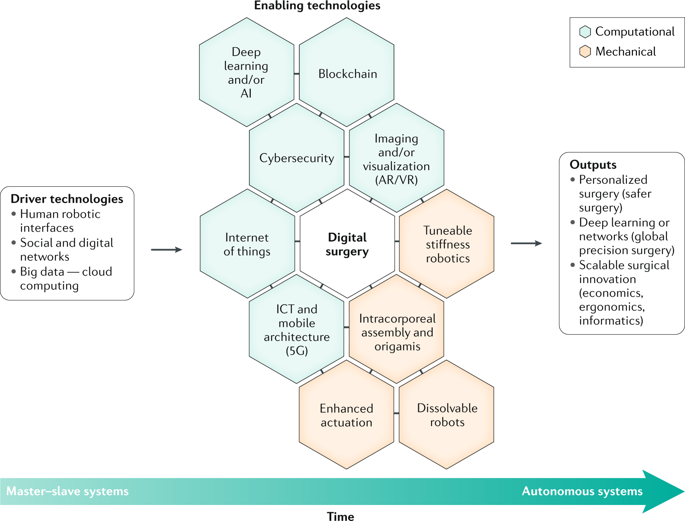Nature Reviews Gastroenterology & Hepatology ( IF 65.1 ) Pub Date : 2020-04-08 , DOI: 10.1038/s41575-020-0290-z James M Kinross 1 , Sam E Mason 1 , George Mylonas 1 , Ara Darzi 1

|
The global numbers of robotic gastrointestinal surgeries are increasing. However, the evidence base for robotic gastrointestinal surgery does not yet support its widespread adoption or justify its cost. The reasons for its continued popularity are complex, but a notable driver is the push for innovation — robotic surgery is seen as a compelling solution for delivering on the promise of minimally invasive precision surgery — and a changing commercial landscape delivers the promise of increased affordability. Novel systems will leverage the robot as a data-driven platform, integrating advances in imaging, artificial intelligence and machine learning for decision support. However, if this vision is to be realized, lessons must be heeded from current clinical trials and translational strategies, which have failed to demonstrate patient benefit. In this Perspective, we critically appraise current research to define the principles on which the next generation of gastrointestinal robotics trials should be based. We also discuss the emerging commercial landscape and define existing and new technologies.
中文翻译:

胃肠手术中的下一代机器人。
全球机器人胃肠手术的数量正在增加。然而,机器人胃肠手术的证据基础尚不支持其广泛采用或证明其成本合理。其持续流行的原因是复杂的,但一个显着的驱动因素是推动创新——机器人手术被视为实现微创精密手术承诺的引人注目的解决方案——不断变化的商业环境提供了提高可负担性的承诺。新系统将利用机器人作为数据驱动平台,整合成像、人工智能和机器学习方面的进步以提供决策支持。然而,如果要实现这一愿景,就必须从目前未能证明患者获益的临床试验和转化策略中吸取教训。在这个视角中,我们批判性地评估当前的研究,以定义下一代胃肠道机器人试验应基于的原则。我们还讨论了新兴的商业环境并定义了现有技术和新技术。

























 京公网安备 11010802027423号
京公网安备 11010802027423号